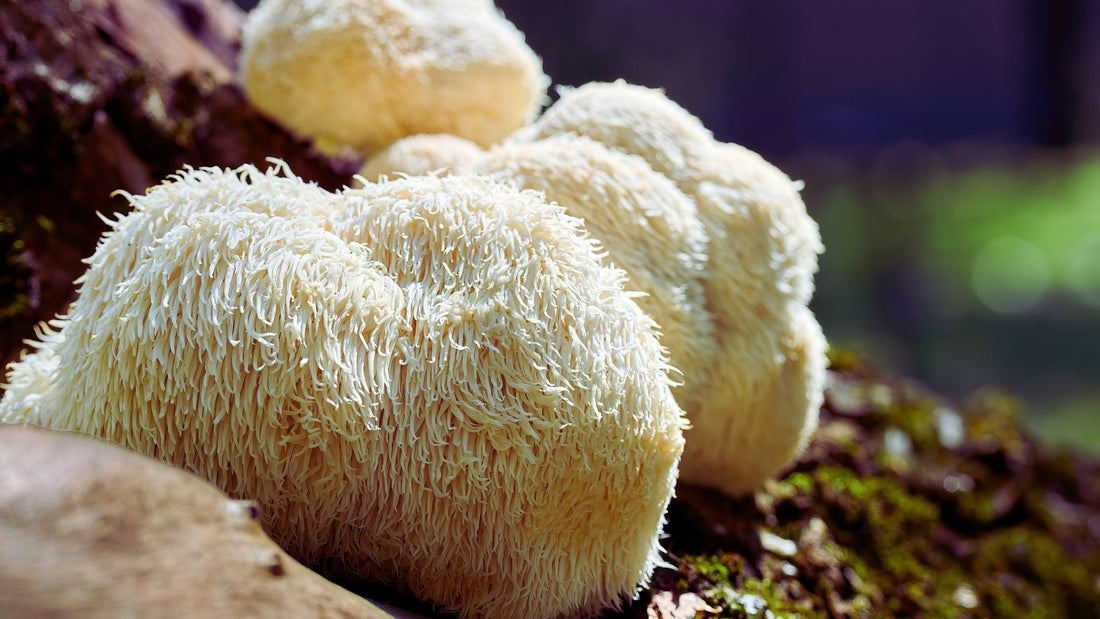The History of Lion's Mane Throughout Traditional Medicine
Anthony Gucciardi
Notorious for its white, silky presentation that resembles the mane of a lion, Lion’s Mane has been a staple in traditional medicine and healing systems with documentation of use dating back centuries. In fact, sources report that Buddhist monks enjoyed Lion’s Mane mushroom tea as a sort of ‘proto-nootropic’ in order to enhance their focusing abilities during meditation centuries ago.
Lion’s Mane Use In East Asia & Traditional Chinese Medicine (TCM)
The history of Lion’s Mane across East Asia demonstrates its notable role as an adaptogen and food-medicine that was cherished for its associated benefits of supporting internal organ systems such as the liver, spleen, lungs, heart, and kidneys. Additionally, it was understood that Lion’s Mane could boost general human vitality. Some sources note its specialty for brain, heart, and gut health support.
Lion’s Mane was traditionally used as both medicine and food within Traditional Chinese Medicine (TCM), and often imbibed as a tea, prepared tonic, or mixed preparation. In China, Lion’s Mane is known as ‘Hóu tóu gū’. There were also folk properties ascribed to Lion’s Mane as a source of calming, restorative capabilities.
“As a traditional medicine, lion’s mane was purported to have multiple potentially beneficial activities including antioxidant, antidiabetic, antilipidemic, antihypertensive, antineoplastic, an immunomodulatory activities as well as hepatoprotective, neuroprotective and cardiovascular protective properties.” - LiverTox: Clinical and Research Information on Drug-Induced Liver Injury [Internet]. National Institute of Diabetes and Digestive and Kidney Diseases; 2012.
‘Yamabushitake’ Lion’s Mane In Japanese Traditional Medicine
Known as yamabushitake in Japan, Lion’s Mane has also had a role in traditional Japanese medicine throughout history. Lion’s Mane was consumed both in regional and temple cuisines alongside its traditional medicine usage.
In our modern age, research continues to be conducted on yamabushitake (Lion’s Mane), revealing the basis for much of its understood beneficial properties. Researchers Koichiro Mori, Satoshi Inatomi, Kenzi Ouchi, Yoshihito Azumi, and Takashi Tuchida examined the effects of Lion’s Mane on mild cognitive impairment in 2009, and wrote in the summary (abstract) of their work:
“A double-blind, parallel-group, placebo-controlled trial was performed on 50- to 80-year-old Japanese men and women diagnosed with mild cognitive impairment… the Yamabushitake group showed significantly increased scores on the cognitive function scale compared with the placebo group.
Bridging Traditional & Modern Usage
Today, advancements in science and a greater understanding of the core compounds that are responsible for the benefits of Lion’s Mane has led to a resurgence in interest across cognitive support and evidence-based wellness. Over the past decades, Lion’s Mane critical bioactive compounds like erinacines and hericenones have been properly reported for their potential to support the stimulation of nerve growth factor (NGF) and support the body’s natural systems across neurological and cognitive function.
As the science continues to emerge around Lion’s Mane, the bridge appears between the history of Lion’s Mane and its traditional uses into present day validation. While not all Lion’s Mane properties held dear to traditional systems will be confirmed to be factual, the growing data regarding Lion’s Mane cognitive support benefits and potential impact on gut health is more than enough to garner interest.
100% human-created content. Professionally reviewed for quality and information content.
Sources:
National Center for Biotechnology Information. PMC Article: Neuroprotective effects of Hericium erinaceus. https://pmc.ncbi.nlm.nih.gov/articles/PMC12030463/
White Rabbit Institute of Healing. Lion’s Mane: Traditional and herbal uses. https://www.whiterabbitinstituteofhealing.com/herbs/lions-mane/
WebMD. Health benefits of lion’s mane mushrooms. https://www.webmd.com/diet/what-are-the-health-benefits-of-lions-mane-mushrooms
National Institutes of Health / NCBI Bookshelf. LiverTox: Clinical and Research Information on Drug-Induced Liver Injury — Hericium erinaceus. https://www.ncbi.nlm.nih.gov/books/NBK599740/
Restorative Medicine Journal. Neurological activity of lion’s mane (Hericium erinaceus) & Traditional Use. https://restorativemedicine.org/journal/neurological-activity-lions-mane-hericium-erinaceus/
PubMed. Improving effects of Yamabushitake (Hericium erinaceus) on mild cognitive impairment: a double-blind placebo-controlled trial (Mori et al.). https://pubmed.ncbi.nlm.nih.gov/18844328/
ScienceDirect. Article on lion’s mane and neuroscience / cognitive potential. https://www.sciencedirect.com/science/article/pii/S1756464624001221
Healthline. Lion’s mane mushroom: benefits, risks, and how to take it. https://www.healthline.com/nutrition/lions-mane-mushroom
ScienceDirect Topics – Neuroscience. Nerve Growth Factor (NGF) overview. https://www.sciencedirect.com/topics/neuroscience/nerve-growth-factor
Cleveland Clinic Health Essentials. Lion’s mane mushrooms: benefits, uses, and safety. https://health.clevelandclinic.org/lions-mane-mushrooms-benefits



